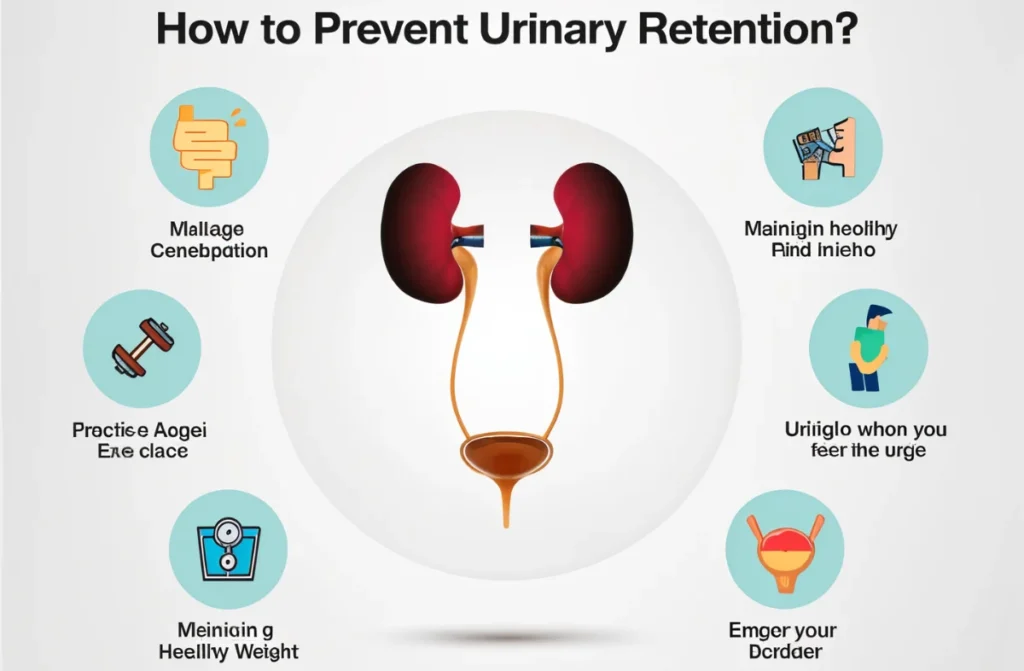Bladder health plays a crucial role in our overall well-being, yet it’s a topic many people tend to overlook until problems arise. If you’re wondering how to improve bladder health, you’re not alone. Many individuals, especially as they age, face bladder-related issues, such as frequent urination, incontinence, and even urinary tract infections (UTIs). The good news is that with the right lifestyle choices and habits, you can significantly improve it, prevent discomfort, and maintain optimal function for years to come. In this guide, we will explore actionable steps to strengthen your bladder and provide insights into various practices, habits, and even a better bladder supplement that supports its health.
How to Improve Bladder Health: Start with Simple Lifestyle Changes
It’s essential to start with the basics. Even small adjustments to your daily routine can have a big impact. Focusing on hydration, exercise, and nutrition can help you strengthen your bladder, reduce unnecessary strain, and ensure that your urinary system functions properly.
Exercise Regularly
Regular physical activity is one of the best ways to improve the health of the bladder. Exercise boosts circulation, helps maintain a healthy weight, and strengthens the muscles around the bladder and pelvic floor. These exercises are key for how to strengthen your bladder and improve bladder control.
How Exercise Helps to Improve the Bladder Health
- Improves bladder control: Regular exercise strengthens the pelvic floor muscles, which are essential for controlling the bladder.
- Reduces pressure: Physical activity helps you maintain a healthy weight, preventing excess pressure on the bladder.
- Supports overall health: Exercise reduces stress, which is linked to many bladder health issues, such as incontinence.
If you’re looking to strengthen your bladder, certain exercises can specifically target the pelvic floor muscles. Pelvic floor exercises, also known as Kegels, involve tightening and relaxing the muscles that control the flow of urine. These exercises are incredibly effective for both men and women and can be done anywhere.

Drink Plenty of Water to Maintain Hydration
Hydration is crucial for bladder health. When you ask how to improve bladder health, one of the simplest but most important steps is to drink plenty of water throughout the day. Staying hydrated helps flush out toxins and bacteria, reducing the risk of urinary tract infections (UTIs) and other bladder problems.
How Proper Hydration Helps Improving Bladder Health
- Prevents dehydration: A well-hydrated body supports the kidneys and bladder, ensuring optimal function.
- Flushes toxins: Drinking water helps eliminate harmful substances, reducing the risk of infections and discomfort.
- Maintains bladder health: Adequate hydration keeps the bladder from becoming overworked or underused, which can lead to complications.
While it’s important to stay hydrated, it’s also crucial to avoid excessive caffeine or alcohol, as these can irritate the bladder and increase the need for frequent urination.
Hydration Tips
- Aim for 6–8 cups of water a day, but adjust based on your activity level and medical conditions.
- Incorporate water-rich foods, like cucumbers, watermelon, and oranges, to boost hydration.
- Limit caffeinated drinks and alcohol, as these can exacerbate bladder issues.
Urinate Properly: Don’t Hold It In
A key aspect of how to improve bladder health is understanding how to urinate properly. Holding in your urine for extended periods can stretch the bladder, leading to discomfort and even damage. It’s essential to urinate when you feel the urge and to empty the bladder completely.
How to Urinate Properly
- Don’t hold it in: Try to urinate when you first feel the urge. Holding urine too long can increase the risk of bladder infections and weaken the bladder muscles.
- Empty completely: Ensure that you fully empty your bladder each time you urinate to prevent any leftover urine from causing problems.
- Avoid straining: Straining to urinate can cause pressure on the bladder and pelvic floor muscles, leading to long-term issues.
By urinating properly, you prevent unnecessary pressure on your bladder and avoid complications that can arise from holding urine for too long.
Eat Foods That Support Bladder Health
Eating a balanced diet is an essential part of how to improve bladder health. Certain foods help strengthen the bladder and reduce the risk of infections, while others may irritate the bladder or worsen symptoms of bladder-related conditions. In addition to a healthy diet, incorporating a better bladder supplement can provide extra support for optimal bladder function and help manage bladder health more effectively
Foods That Support Bladder Health
- Cranberries: Cranberries have been shown to prevent UTIs, which can cause inflammation and infection in the bladder.
- Pumpkin seeds: These seeds are rich in antioxidants and magnesium, which help promote bladder control and reduce irritation.
- Leafy greens and whole grains: Foods high in fiber and magnesium, such as spinach, kale, and whole grains, support bladder function and reduce the risk of infections.
Foods to Avoid
- Spicy foods: Hot peppers and spicy dishes can irritate the bladder, leading to discomfort and urgency.
- Caffeinated drinks: Coffee and tea can irritate the bladder lining and increase the frequency of urination.
- Artificial sweeteners: These can cause bladder irritation in some individuals, leading to discomfort and urgency.
Practice Good Hygiene to Prevent Infections
Good hygiene is essential when considering how to improve bladder health. Maintaining proper hygiene can help prevent infections, which are one of the most common causes of bladder issues. It’s especially important for women to practice proper hygiene after using the bathroom to avoid bacterial infections, such as urinary tract infections (UTIs).
Hygiene Tips
- Wipe front to back: This prevents bacteria from the rectal area from spreading to the urethra and bladder.
- Keep the genital area dry: Moisture can contribute to bacterial growth, so always keep the area clean and dry.
- Wear breathable fabrics: Cotton underwear allows the skin to breathe, reducing moisture buildup.
Practicing proper hygiene helps protect the urinary system and keeps the bladder healthy.
Do Pelvic Floor Exercises Regularly
Pelvic floor exercises are crucial for how to improve bladder health and strength. These exercises, commonly known as Kegels, involve contracting and releasing the muscles that support the bladder. Strengthening the pelvic floor muscles helps prevent incontinence, reduces the risk of bladder infections, and improves bladder control.
How to Strengthen Your Bladder with Pelvic Floor Exercises
- To locate your pelvic floor muscles, attempt to pause urination midstream — the muscles you engage are your pelvic floor.
- Contract these muscles for 5 seconds, then release for 5 seconds.
- Gradually increase the length of each contraction and relaxation period as your strength improves.
- Do 3 sets of 10 repetitions each day.
Pelvic floor exercises are simple, effective, and can be done at any time, helping you improve the bladder health over time.
Check Medication Side Effects
Certain medications can impact bladder health, especially if they interfere with bladder function or cause urinary retention. If you are taking medications for chronic conditions, it’s essential to monitor any side effects that may affect your bladder.
How Medication Affects Bladder Health
- Diuretics: These medications can increase urination frequency and cause dehydration, which can irritate the bladder.
- Antihistamines: Some antihistamines can cause urinary retention or difficulty urinating.
- Blood pressure medications: Certain medications for high blood pressure may interfere with bladder control and cause urgency or incontinence.
Always consult with your healthcare provider to ensure that your medications aren’t negatively impacting your bladder health.
Quit Smoking for Better Bladder Health
Smoking is not only harmful to your lungs but can also significantly impact your bladder health. The chemicals in tobacco smoke can irritate the bladder and increase the risk of bladder cancer. Quitting smoking is one of the best decisions you can make for your bladder. Additionally, consider incorporating a better bladder supplement to support bladder function and overall urinary health.
How Smoking Affects Bladder Health
- Increases the risk of bladder cancer.
- Irritates the bladder lining, leading to frequent urination and discomfort.
- Reduces circulation, affecting bladder function.
By quitting smoking, you protect your bladder from harmful toxins and significantly reduce the risk of bladder-related diseases.
Communicate with Your Doctor About Bladder Health
Finally, if you are experiencing persistent bladder problems, it’s essential to communicate with your doctor. They can provide personalized guidance on how to improve bladder health and recommend treatments or medications to address any underlying conditions. Open communication with your healthcare provider ensures you receive the best care possible.
What to Discuss with Your Doctor
- Frequent urination or urgency: If you experience a sudden urge to urinate or go frequently, your doctor can recommend treatment options.
- Incontinence: If you are struggling with bladder control, your doctor may suggest therapies, medications, or pelvic floor exercises.
- Chronic conditions: If you have diabetes or other health conditions, your doctor can help manage these issues to support bladder health.
Conclusion
Improving bladder health doesn’t require drastic changes, but it involves mindful, consistent choices. Exercise, hydration, nutrition, and pelvic floor exercises are key to maintaining a healthy bladder. If you’re wondering how to improve bladder health, these habits will help strengthen your bladder and prevent future issues.




